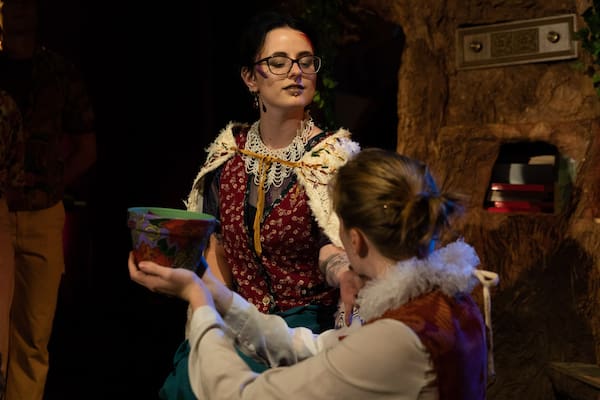SUDS’ Orlando is a masterpiece in textual appropriation. Its sold out opening night boomed with the colour, vibrancy and passion that you expect from theatre, but spoke to so much more than that. As part of Mardi Gras 2020, Orlando, adapted by Sarah Ruhl from the novel of the same name, balances the timeless story against the intricacies of gender identity and self-discovery.
Penned by Virginia Woolf in 1928, her novel-length love letter to Vita Sackville-West is a satirical ‘biography’ of its protagonist, who undergoes a sex change at the age of thirty-six and proceeds to live at the same age for several centuries. Throughout, Orlando is a character suspended by both an absence and over saturation of identity, speaking to a timeless struggle not often represented. The production utilises gender as both a symbol and an accessory, highlighting the intricacies of gender identity and the lengths that society still has to go to completely appreciate these complexities.
Advertisements for the production invited viewers to “Join us on a journey where time is Orlando’s play-thing and queerness, melodrama and identity are celebrated in all their undefinable intricacies.” SUDS’ production, directed by Sean Landis, most certainly did this caption justice.
The set (Iris Higginbotham and Paris Paris) and costume design (Dan Rogers and Hugo Fraser), overseen by lead designer Rosie Wylie, transported audiences back through Woolf’s vision, while stunning lighting design (Tom Hicks and Victoria Vu Tang) and musical accompaniments (Verity Skala, Victoria Vu Tang, Jessica Snelleman and Claudia Stone-Stacy, led by Sam Cheng) gave even more depth and colour to the cast’s performances. A large tree, which served as the set’s centrepiece, was a particular stroke of design genius, holding the story’s key symbol in the minds of audiences throughout.
Robbie Wardhaugh shined as the eponymous character, capturing the complex nuances directed through the storyline. Credit must also be given to Sam Martin, Robin Eames and Rachel Seeto, who each dissolved into their individual roles and gave their characters a sense of enchanting vibrancy. While not holding main roles, Isabelle Laxamana, Isla Mowbray, Madeline Gandhi and Max Cattana sustained the production’s flavour.
The opening did feel to lack an engaging pace in areas. Additionally, the delivery of certain lines came across as monotonous however, as this was the narrated portion of the performance, the consistency of delivery may very well have been a creative choice.
As much as we can praise the individual elements of the production, which were executed brilliantly, it is the overall message of Orlando which makes the show so potent. By using Orlando as a means through which to explore the complexities of queer identity, SUDS have delivered a seminal celebration of gender fluidity which draws its joyousness from its proud representation. Orlando is ultimately interpretive, through its adjacent exploration of gender roles and biases, however, cuts through with such clarity in the most seminal spaces.
The protagonist is a representation for those who have felt isolated by their past, or suspended in a search for their identity. The story is layered with symbolism, giving even more depth and power to these representations, and after 2 hours of watching Orlando struggle through the processes of self-discovery, the entire show is beautifully summed up in its final line: “I am about to understand.”
The production is a masterclass in storytelling and performance, which should be seen by all.
Orlando will be running at the Cellar Theatre until March 7th. 100% of ticket sales are being donated to Twenty10, a Sydney-based support service for LGBTQIA+ young people.





